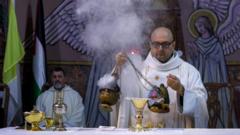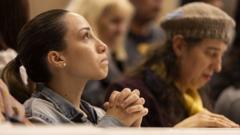Pope Francis died at the age of 88, prompting global mourning and urgent preparations for his funeral, set for Saturday. With a legacy steeped in compassion for marginalized communities, a decision on his successor looms. The complexities of the papal burial and conclave process come to the forefront as the world reflects on Francis’s contributions.
Farewell to a Papal Icon: Pope Francis Passes Away, Funeral Arrangements Underway

Farewell to a Papal Icon: Pope Francis Passes Away, Funeral Arrangements Underway
As the world mourns the loss of Pope Francis, preparations for his funeral highlight the enduring impact of his humble leadership on the Catholic Church and broader global issues.
Vatican City—The Catholic world is in mourning following the death of Pope Francis at the age of 88. The Vatican has announced that the pope’s funeral will be held on Saturday at 10 a.m., marking a moment of significant transition in the Catholic Church. In accordance with his wishes for a modest burial, Francis will be laid to rest in a simple coffin, eschewing the traditional ornate arrangements that typically accompany papal funerals.
As preparations commence, cardinals have begun flocking to the Vatican to honor his legacy and to discuss the process of selecting a new pontiff. Cardinal Giovanni Battista Re, the dean of the College of Cardinals, convened the first meeting where they outlined the immediate steps to honor Francis. His body will be moved to St. Peter’s Basilica on Wednesday for the faithful to pay their respects before the funeral rites commence.
The funeral ceremony commands a detailed protocol, lasting approximately nine days, concluding with the traditional entombment which usually occurs several days after a pope’s passing. During this window, a conclave will be convened to elect his successor, liable to profoundly influence the direction of the Catholic Church with its 1.3 billion adherents.
Memorial services have been held worldwide, with nations such as Australia, Japan, and the United States declaring periods of mourning. Various leaders, including President Trump, have confirmed their attendance at the funeral, signaling Francis's reach as a global leader who sought to advocate for the marginalized and challenge established norms.
As discussions around potential papal candidates begin, the future of the Church may hinge upon the next leader's ability to navigate the evolving global landscape and continue advocating for social issues central to Francis's ministry—such as climate change and refugee rights. Some speculate on contenders from diverse backgrounds, while others ponder the prospect of a return to conservative governance within the Church.
In his lifetime, Pope Francis was known for his accessibility and outreach, often favoring a humble approach over the traditional papal grandiosity. He expressed his desire for a simple burial, insisting on an undecorated tomb with merely the inscription "Franciscus." The world now watches closely as the Catholic Church prepares to turn a new page, grappling with the complex legacy left by a pope who reshaped its engagement with modernity.





















